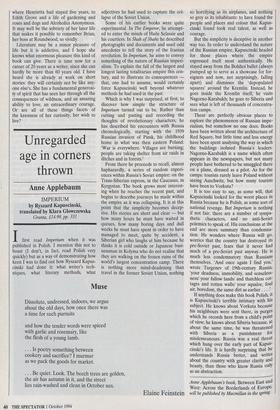Unregarded age in corners thrown
Anne Applebaum
IMPERIUM by Ryszard Kapuscinski, translated by Klara Glowczewska Granta, £14.99, pp. 331 Ifirst read Imperium when it was published in Polish. I mention this not to boast (I don't, in fact, read Polish very quickly) but as a way of demonstrating how keen I was to find out how Ryszard Kapus- cinski had done it: what writer's tech- niques, what literary methods, what adjectives he had used to capture the col- lapse of the Soviet Union.
Some of his earlier books were quite experimental. In The Emperor, he attempt- ed to enter the minds of Haile Selassie and his courtiers. In Shah of Shahs he described photographs and documents and used odd anecdotes to tell the story of the Iranian revolution. In Imperium, he aims to convey something of the nature of Russian imperi- alism. To explain the fall of the largest and longest lasting totalitarian empire this cen- tury, and to illustrate its consequences that, one had to assume, would certainly force Kapuscinski well beyond whatever methods he had used in the past.
Which is why I was surprised, at first, to discover how simple the structure of Imperium turned out to be. Rather than cutting and pasting and recording the thoughts of revolutionary characters, he has described his encounters with Russia chronologically, starting with the 1939 Russian invasion of Pinsk, his childhood home in what was then eastern Poland: War is everywhere. Villages are burning; people are taking shelter from air raids in ditches and in forests.'
From there he proceeds to recall, almost haphazardly, a series of random experi- ences within Russia's Soviet empire: on the Trans-Siberian express, in the Caucasus, in Kyrgystan. The book grows most interest- ing when he reaches the recent past, and begins to describe journeys he made within the empire as it was collapsing. It is at this point that the simplicity becomes decep- tive. His stories are short and clear — but how many hours he must have waited in queues, how many boring days and dull weeks he must have spent in order to have managed to meet, quite by accident, a Siberian girl who laughs at him because he thinks it is cold outside or Japanese busi- nessman in Kolyma who do not realise that they are walking on the frozen ruins of the world's largest concentration camp. There is nothing more mind-deadening than travel in the former Soviet Union, nothing so horrifying as its airplanes, and nothing so grey as its inhabitants: to have found the people and places and colour that Kapus- cinski found took real talent, as well as courage.
But the simplicity is deceptive in another way too. In order to understand the nature of the Russian empire, Kapuscinski headed for those places where the empire expressed itself most authentically. He stayed away from the Bolshoi ballet (always pumped up to serve as a showcase for for- eigners and now, not surprisingly, falling apart) and dismisses the 'depopulated squares' around the Kremlin. Instead, he goes inside the Kremlin itself; he visits Nagorno-Karabakh; he goes to Siberia and sees what is left of thousands of concentra- tion camps.
These are perfectly obvious places to explore the phenomenon of Russian impe- rialism, but somehow no one does. Books have been written about the architecture of Red Square, but little time and less energy have been spent analysing the way in which the buildings isolated Russia's leaders. Nagomo-Karabakh is a name which often appears in the newspapers, but not many people have bothered to be smuggled there on a plane, dressed as a pilot. As for the camps: tourists rarely leave Poland without seeing Auschwitz, but how many tourists have been to Vorkuta?
It is too easy to say, as some will, that Kapuscinski looked for the worst places in Russia because he is Polish, as some sort of national revenge. But Imperium is nothing if not fair: there are a number of sympa- thetic characters, and no anti-Soviet polemics to speak of. His conclusions at the end are more summary than condemna- tion. He wonders where Russia will go, worries that the country has destroyed its pre-Soviet past, fears that it never had much of a pre-Soviet past anyway. He is much less condemnatory than Russians themselves. 'And once again I find you,' wrote Turgenev of 19th-century Russia, `your deadness, immobility, and senseless- ness/ your fallow lands/ and thatchless cot- tages and rotten walls/ your squalor, foul air, boredom, the same dirt as earlier ..
If anything does make this book Polish, it is Kapuscinski's terrible intimacy with his subject. He knows about Vorkuta because his neighbours were sent there, in purges which he records here from a child's point of view; he knows about Siberia because, at about the same time, he was threatened with Siberia as a punishment for misdemeanours. Russia was a real threat which hung over the early part of Kapus- cinski's life. It is hardly surprising that he understands Russia better, and writes about the country with greater clarity and beauty, than those who know Russia only as an abstraction.
Anne Applebaum's book, Between East and West: Across the Borderlands of Europe, Elaine Feinstein will be published by Macmillan in the spring.


























































 Previous page
Previous page